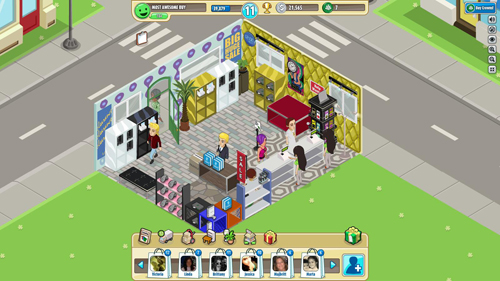Mentez公司CEO谈社交游戏的海外运营及发展机遇
在《Market Street》这款社交游戏中,玩家的任务就是开办各种数字商店,与好友争夺顾客。不少玩家为了保持竞争优势,就会花真钱囤积一些市场需求量大或者节日商品,比如说情人节的玫瑰花束。但对于那些不过情人节的非北美地区玩家来说,这些玫瑰花就没什么吸引力了。
为了解决这种情况,《Market Street》的开发商Playdom与位于迈阿密的Mentez公司合作,对这款游戏的巴西版本进行本土化处理,将其中的情人节主题改为Paraíso das Compras节日庆典。据游戏邦了解,Mentez从这个一年一度的巴西节日中提取了彩色羽毛装饰、乐器、五彩纸屑、喧闹的人群等民族元素,将其植入在Orkut平台上运行的葡萄牙语版《Market Street》中。
Playdom和其他数字游戏公司目前都在向海外进军,它们通过与Mentez等代理公司的合作,将游戏打入这些市场。据投资银行ThinkEquity预测,2011年全球虚拟商品市场规模将达61亿美元,在未来两年内,社交游戏的海外虚拟商品销售额将增长64%,几乎快赶上美国本土市场75%的增长率。游戏开发商必须抓住这种海外发展机遇,才能创造更大的利润。游戏邦认为,有望从中掘金的社交游戏开发商包括:迪士尼在2010年斥资5.63亿美元收购的Playdom,EA出手4亿美元收购的Playfish,以及Zynga这个坐拥2.71亿用户的社交游戏巨头,该公司目前已经成为硅谷最抢手的新兴企业,在传出T.Rowe Price和Fidelity Investments向其注资的消息后,身价已涨到了100亿美元。
要让一款游戏实现国际化运营,就必须综合考虑当地市场的文化传统、建筑风格、节日习俗以及使用货币——这些关键性的元素都是现实世界的一种反映。Mentez公司CEO胡安·佛朗哥(Juan Franco)表示,“实现游戏的本土化运营,并不只是翻译语言这么简单。”游戏邦获悉,Mentez已成立了四年,主要帮助游戏公司开拓南美、中美市场,在圣保罗、墨西哥城、波哥大、麦德林、哥伦比亚等城市设有办事处。提供此类服务的还有俄罗斯公司101XP和香港的6waves。101XP为美国游戏设计者打开了东欧市场,将社交游戏推向了Mail.ru等当地最大的社交网站,而6waves则帮助海外社交游戏吸引亚洲用户。
尽管拉美用户仅占Zynga游戏玩家的10%,但据Zynga的业务发展高级主管赖安·林顿(Ryan Linton)表示,中美和南美是最具发展潜力的社交游戏市场,是该公司的巨大发展机遇。
Mentez聘请了60名以上熟悉拉美虚拟商品交易的能力,以及美术设计师、翻译人员和了解当地经济环境的员工,推动游戏的本土化运营。除了定制本土化数字内容,Mentez还通过提供客服、市场营销服务,推动游戏的海外业务运营。据佛朗哥所称,玩家在本土化处理的游戏上的消费行为,比非本土化游戏多五倍。Mentez对游戏的虚拟商品交易抽取40%至60%的提成,这些虚拟商品每件的价格一般是1至10美元。
除此之外,Mentez还为这些游戏提供计费服务。据Commerce Dept在2008年的一份报告显示,在中美和南美地区,信用卡用户仅占10%。不过Mentez却可以通过网吧、便利店和其他拉美零售点供应2至20美元的游戏预付卡,支持非信用卡用户购买虚拟商品。虽然Mentez没有为Zynga设计本土元素的虚拟商品,但它通过Paymentez零售服务,帮助后者在拉美运营的游戏解决了收费问题。Zynga的林顿表示,美国用户可以轻松地使用在线交易功能,但这种消费方式在拉美并不普及。中国游戏开发商五分钟旗下最受欢迎的《开心农场》是《FarmVille》的竞争对手,目前也已通过Mentez的游戏预付卡为拉美用户提供消费服务。
佛朗哥表示,因为社交游戏在拉美还是新兴行业,所以Zynga等游戏可以在这个市场获得更多发展机遇。(本文为游戏邦/gamerboom.com编译,转载请注明来源:游戏邦)
Getting Social Media Games to Play Overseas
In Market Street, a game played on social networks like Facebook, wannabe entrepreneurs open digital storefronts and compete with friends to attract shoppers. Many players pay real money to stock their virtual shelves with in-demand or seasonal items, such as rose bouquets on Valentine’s Day. That doesn’t work for the hundreds of thousands of Market Street players outside the U.S., in countries that don’t celebrate Valentine’s Day and other American holidays.
So Playdom, the company behind Market Street, hired Mentez, a startup based in Miami, to come up with a Valentine’s Day alternative for the Brazilian adaptation of the game, known as Paraíso das Compras. As a solution, Mentez programmed digital versions of iconic objects from the annual Carnaval festival, including feathered costumes, musical instruments, confetti, and noisemakers. They will be put up for sale in the Portuguese-language edition of the game, which is played on Orkut, Brazil’s most popular social network.
Playdom and other digital game companies are looking for growth in foreign markets, and they are relying on Mentez and its competitors to be their local tour guides. The market for virtual goods will total $6.1 billion worldwide in 2011, estimates investment bank ThinkEquity. Over the next two years, overseas sales of virtual goods in social games will grow 64 percent, nearly as fast as the 75 percent growth expected in the U.S. Game makers will have to take advantage of foreign opportunities if they’re to live up to lofty expectations: Walt Disney (DIS) paid $563 million to acquire Playdom in 2010, and Electronic Arts (ERTS) spent as much as $400 million on rival Playfish. Zynga, the social games leader with 271 million users, has become one of Silicon Valley’s hottest startups and is valued at $10 billion after T. Rowe Price (TROW) and Fidelity Investments recently held talks to invest in the company.
Internationalizing a game requires knowledge of country-specific traditions, architecture, holidays, and currencies—all crucial elements in games that are supposed to feel like simulations of the real world. “To really localize a game, it goes beyond translation,” says Juan Franco, chief executive officer of Mentez. The four-year-old company specializes in adaptations for South and Central America, and has offices in São Paolo, Mexico City, Bogotá, and Medellin, Colombia. Russian company 101XP helps U.S. game designers crack the Eastern European market and target users on the region’s biggest social networks, including Mail.ru. Hong Kong-based 6waves customizes social media games for Asian audiences.
Among the most promising opportunities for global growth is in Central and South America, says Ryan Linton, senior director of business development for Zynga. Today only about 10 percent of Zynga players are in Latin America, and the region “is an untapped giant for us,” he says.
Mentez employs more than 60 experts in virtual goods, including graphic designers, translators, and business-school graduates versed in the economies of Latin American countries. In addition to designing custom digital objects, as it did for Playdom’s Market Street, Mentez helps game makers keep tabs on what sells well overseas, provides customer service, and markets games.Overseas players buy up to five times the number of localized products as they do non-customized ones, says Franco. Mentez takes between 40 percent and 60 percent of the revenues generated from the virtual goods it develops, which usually sell for $1 to $10 apiece.
In some cases, Mentez also facilitates the payments. In Central and South American countries, only about 40 percent of people have credit cards, according to a 2008 report from the Commerce Dept. Mentez sells cards pre-loaded with $2 to $20 in Internet cafes, convenience stores, and other retail locations across Latin America, so gamers without credit cards can buy digital goods, too. While Zynga does not rely on Mentez to design virtual goods for its games, it began using the retail network, dubbed Paymentez, in late February. “Right now it’s really easy to make a transaction online in the U.S.,” says Zynga’s Linton. “They don’t have that luxury in many of the Latin American countries.” Chinese game developer Five Minutes, whose Happy Farm game is one of China’s most popular and a competitor to Zynga’s FarmVille title, already uses Mentez to sell cards and reach players in Latin America.
Mentez CEO Franco says that since social games are a new business in Latin America, “there is an opportunity for companies like Zynga to be aggressive in that market.” Brazil, in particular, “is a huge opportunity,” he says. “It’s the hottest market in the world today” for social games. (source:businessweek)








































 闽公网安备35020302001549号
闽公网安备35020302001549号